The modern world is about enabling businesses with innovative technology revolutions. Accordingly, technologies like cloud computing are playing a great role in this transformation. It’s 2024 and many companies do a comparison such as AWS vs Google Cloud Platform for choosing the best cloud services.
Nowadays, we are holding on tightly awaiting many great innovations and technological trends. What remains true is the fact that the way we perceive products will never be the same. Thus, the Internet is a big cloud connecting all of us intact in a way that’s brilliant, massive, and awe-inspiring.
Cloud computing is empowering companies of any size and capacity. This makes it possible for them to outreach many more customers worldwide and in the USA. Subsequently, it allows them to efficiently broadcast, showcase, and sell their services or products to them.
Amazon is among the pioneering members of cloud computing, launching Amazon Web Services (AWS) in March 2006. Google did not hold for long and introduced the Google Cloud Platform (GCP) in April 2008. Together with Microsoft’s Azure, they make up the top three of the cloud services platforms.
AWS has been the most popular platform for the cloud for many years. Existence in the web services landscape from July 2002 gives Amazon a lead in AWS vs Google Cloud Platform showdown. But the Google Cloud Platform is also ensuring to stand on its ground in this regard.
In this post, we touch base on the surface of these powerful cloud platforms. As both AWS and Google Cloud Platform are so huge and provide wide-ranging features. So, we evaluate the relative aspects of these cloud computing platforms regarding IT support & DevOps services for business.
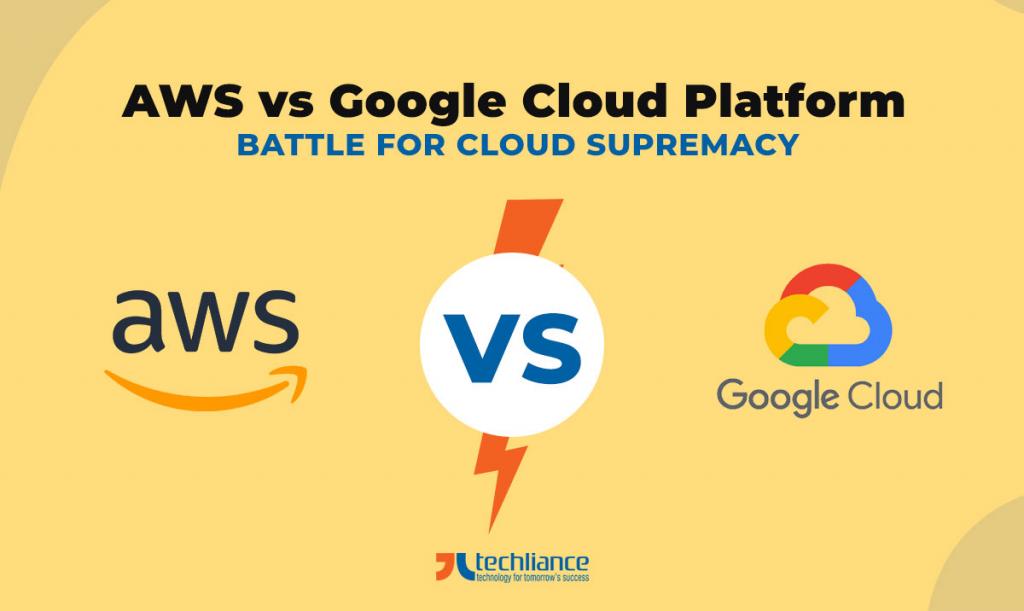
An up and a close look at Amazon Web Services (AWS)
Undeniably considered as the current market leader for cloud, AWS is owned by Amazon. Because you already know, being the front-runner has its advantages. AWS has had the chance to innovate and bring out services that impact companies of varying magnitudes.
This makes it possible for the AWS platform to cater to small to large businesses. Even, it helps government-level companies scale through their cloud platform. Also, in their quest to facilitate the big guns, they don’t disappoint the startups and new entrepreneurs.
All great things start with small steps. Similarly, AWS began its journey through an internal cloud offering. By 2006, it was able to provide cloud platform services like Amazon S3 cloud storage and elastic compute cloud (EC2).
Like they say “the rest is history”. Today, AWS offers more than 200 services to millions of users. AWS proudly serves lots of businesses globally and in the United States.
A sneak glimpse on Google Cloud Platform (GCP)
How could Google stay behind living in the era of cloud computing, and not offer its very own cloud platform? In 2011, Google initiated the public launch of their Google Cloud Platform with over 100 cloud services. For example, computation, storage, networking, big data, etc.
Now, Google Cloud Platform (GCP) has become quite a sought-after cloud platform. It provides several high-demand services relevant to the cloud ecosystem. Also, these even include Google Workspace, enterprise Android and Chrome OS.
When it comes to comparison, Google Cloud Platform is smaller than AWS. However, it has a powerful set of services to support applications of varied magnitude. Essentially, Google Cloud Platform competes with Microsoft Azure for runner-up to AWS.
Comparison of AWS and Google Cloud Platform in features
We can safely conclude by the analysis of basic cloud services that both Amazon and Google provide comparable features. Even though AWS has been the front-runner in the cloud landscape. Google Cloud Platform has made sure to have an answer to each of the elementary cloud services.
This way Google Cloud Platform (GCP) remains at par competition with AWS. So, companies can assess their similar features and unique benefits for cloud computing. It permits them to select the best cloud platform between the two competitors.
Especially, if you are a startup or a small business looking out to move to a cloud-based solution. You have a sound competition between the two cloud services platforms. Subsequently, this also helps you in getting started on your cloud journey.
Here are some factors in AWS vs Google Cloud Platform assessment that can assist you in decision making during 2024.
- Regional availability
- Number of services
- Computation
- Databases & storage
- Networking
- Specialized capabilities
- Pricing
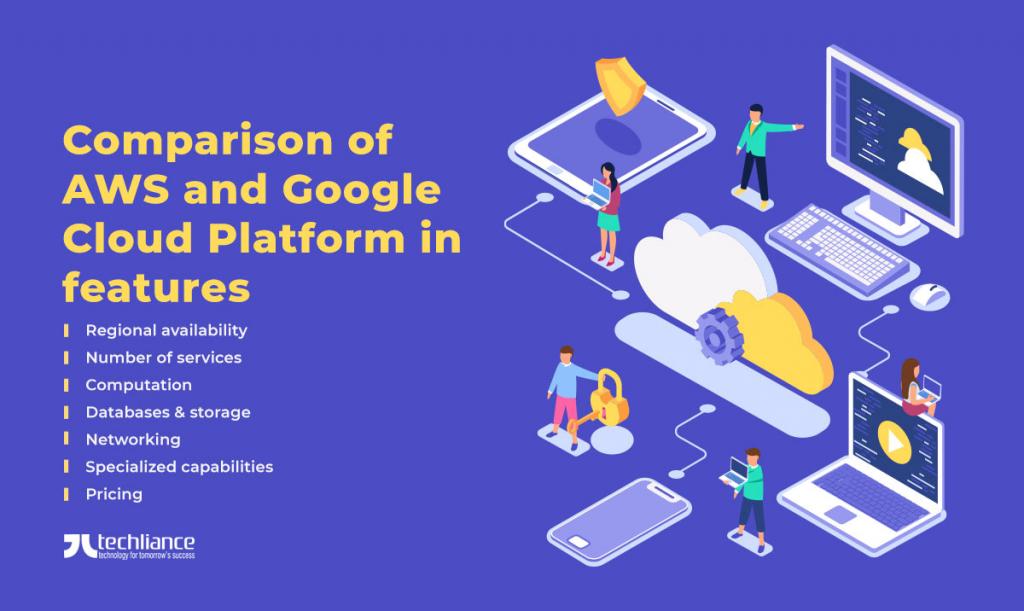
Let’s compare the two cloud platforms in these areas to see which fares better.
Regional availability
By 2022, AWS is available in 26 geographic regions with 84 availability zones. Also, it has more than 218 edge locations and 12 regional edge caches. Amazon has plans for 8 more availability zones in the future.
AWS offers specialized services that cater to the Chinese market with data centers located in China. Whereas, GCP is accessible in 29 regions with 88 zones and 146 edge locations till 2022. Google Cloud Platform is planning to launch into 10 more availability zones.
Number of services
When it comes to AWS, they have the largest catalog with more than 200+ cloud services. While Google Cloud Platform has around 100+ cloud service offerings. This means that the AWS platform has a lot more service coverage in comparison to the Google Cloud Platform.
Moreover, AWS offers a wider range of options for small, medium, and large-scale enterprises. That’s what Google Cloud Platform still not fully covers on that magnitude. Now, we take a look at the type of services under specific areas that both cloud environments provide.
Computation
AWS presents the following computation varieties.
- VM (EC2)
- PaaS (Elastic Beanstalk)
- Container (AWS Elastic Container/Kubernetes service)
- Serverless functions (AWS Lambda)
While Google Cloud Platform has these computation features.
- VM (Google Compute Engine)
- PaaS (Google App Engine)
- Container (Google Kubernetes Engine)
- Serverless functions (Google Cloud Functions)
Databases & storage
AWS covers the following databases and storage options.
- RDBMS (AWS RDS)
- NoSQL (DynamoDB, SimpleDB),
- Object Storage (S3 (Simple Storage Service)
- File Storage (Elastic File System)
- Archive Storage (Amazon Glacier)
- Data Warehouse/Data Lake (Amazon Redshift)
Whereas Google Cloud Platform delivers these databases and storage opportunities.
- RDBMS (Cloud SQL)
- NoSQL (BigTable, Cloud Database)
- Object Storage (Google Cloud Storage)
- File Storage (Google Filestore)
- Archive Storage (Google Storage)
- Data Warehouse/Data Lake (Google BigQuery)
Networking
AWS brings these networking offerings.
- Virtual Network (Virtual Private Cloud VPC)
- Load Balancing (Elastic Load Balancer)
- Firewall (AWS Firewall or Web Application Firewall)
- DNS (Route 53)
- CDN (Amazon CloudFront)
On the other hand, Google Cloud Platform has these networking selections.
- Virtual Network (Virtual Private Cloud VPC)
- Load Balancing (Google Cloud Load Balancing)
- Firewall (Google Cloud firewalls)
- DNS (Google Cloud DNS)
- CDN (Cloud CDN)
Specialized capabilities
AWS and Google Cloud Platform both have services for AI & ML, DevOps, IoT, business analytics, and AR & VR. Besides, AWS provides coverage for game development, end-user computing, and Robotics. In contrast, Google Cloud Platform is yet to make an entry in these service areas.
Just in the event, you are a company looking to branch out to a specialized service. Then your choices with Google Cloud Platform are probably limited. It makes AWS a better choice in this use case.
Pricing
The pricing of both platforms depends on user requirements, the services that you want to utilize, and their usage. Thus, putting in a rough number is not rather advisable. As the breakdown of pricing is reliant on the mentioned factors.
Various companies are enjoying both cloud platforms at affordable pricing without any concerns. The best part about any cloud platform is that the rates go up as you scale up. So, this makes it easy to optimize resources, and reserve instances as per your set budget.
Relevant reading: AWS vs Microsoft Azure
AWS or Google Cloud Platform: Who serves whom in cloud?
A prime client showcase demonstrates that you have all the top names vowing for you in the market. Correspondingly, this helps you in persuading prospective customers to come onboard. Let’s see what clientele the two giant cloud platforms like AWS and Google Cloud Platform have got.
Big brands that AWS is fueling in Cloud
AWS has captured some prominent leading companies serving in diverse industries. For instance, the undeniable kings of on-demand tv Netflix are comfortably hosting their data on the secure storage of AWS. Furthermore, even FMCGs such as Coca-Cola are relying on AWS. Some notable customers of AWS are the following.
- Netflix
- ESPN
- BBC
- Turner Broadcasting
- Airbnb
- Coinbase
- Lyft
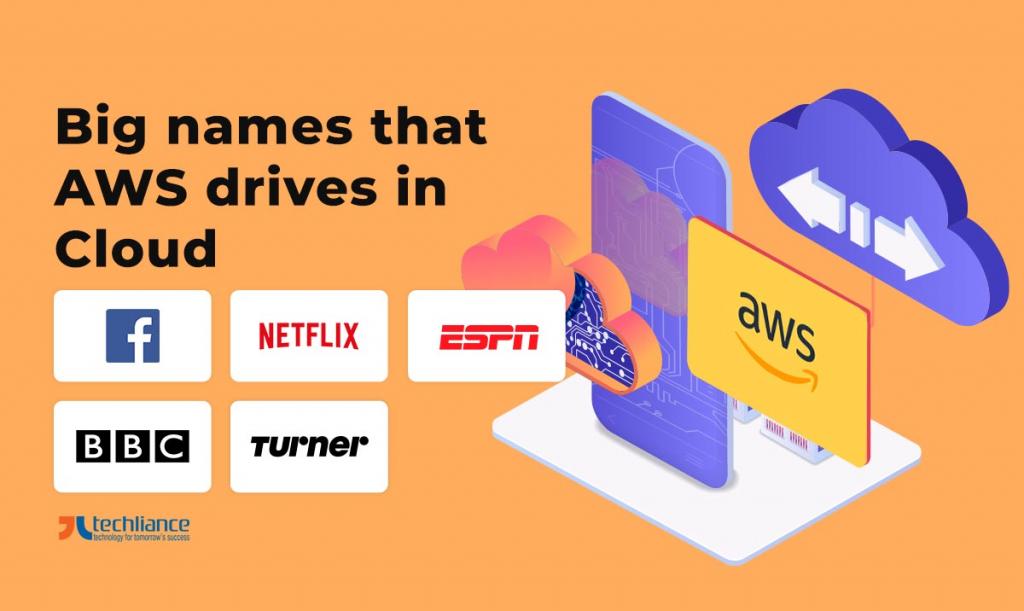
Top clients that Google Cloud Platform runs in Cloud
This seems that Google Cloud Platform has a matchable number of important companies endorsing it. For example, corporations like Toyota, PayPal, and Target trust GCP as their cloud computing solution platform. Also, GCP is the power behind Unilever, an FMCG giant with vast products and solutions universally and in the US. Few noteworthy commercial users of Google Cloud Platform are as follows.
- Etsy
- Airbus
- PayPal
- eBay
- UPS
- P&G
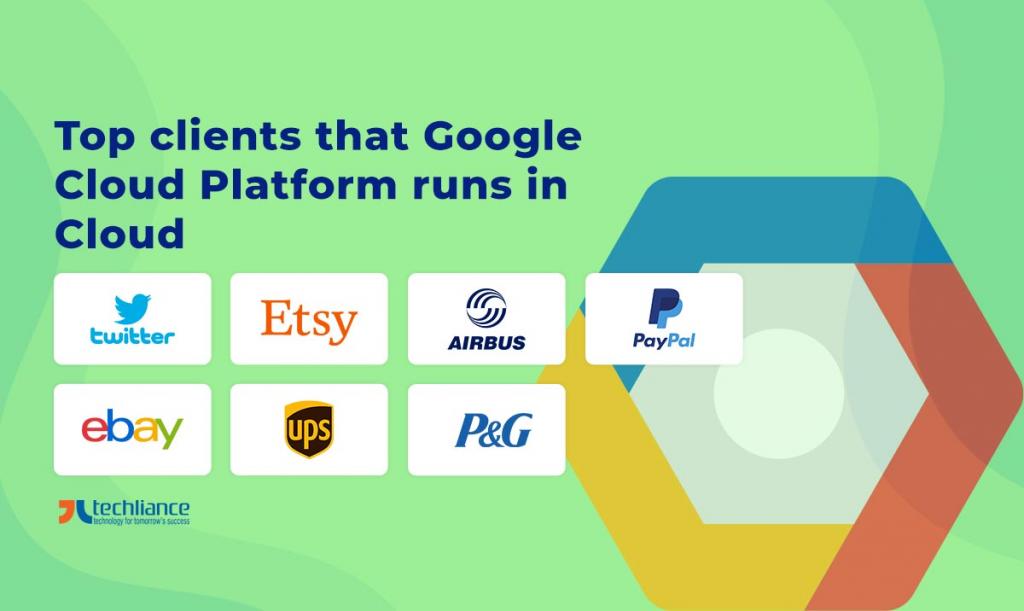
Tradeoffs in AWS vs Google Cloud Platform evaluation
When we perform showdowns of cloud platforms such as AWS vs Google Cloud Platform. We always paint very rosy pictures of them being outstanding in every perspective. Nevertheless, just like other products, both cloud environments have certain shortcomings.
- Hard to decide the best
- Support isn’t free
- Lesser coverage
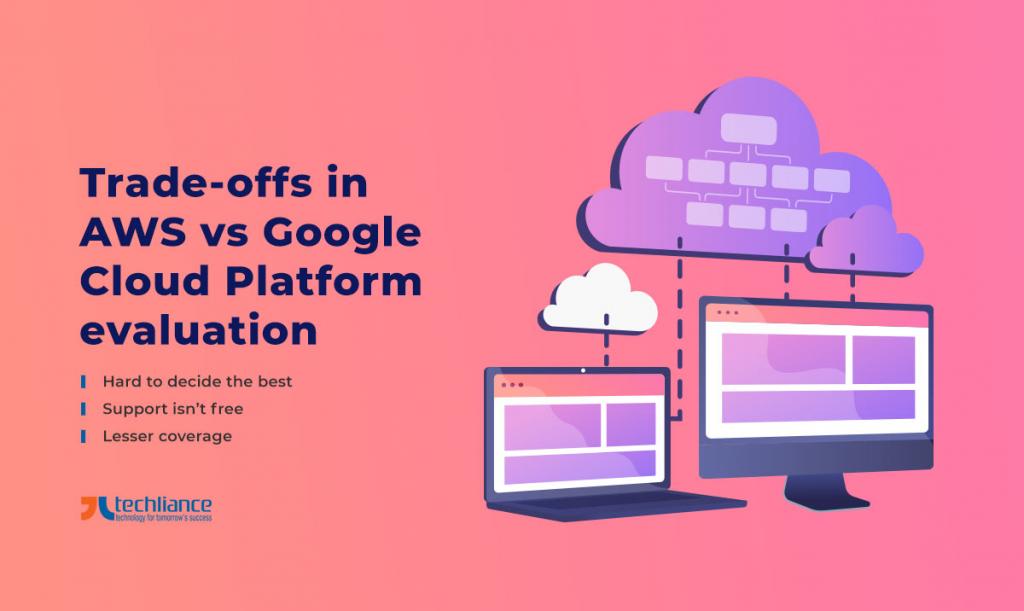
Lastly, we discuss these limitations of AWS and Google Cloud Platform below.
Hard to decide the best
Any upcoming business can face a tough time determining the right cloud platform. Considering that there are a plethora of cloud services to choose from. Also, hundreds of service offerings from AWS or Google Cloud Platform make the decision tough as well.
Congruently, the options for the hybrid cloud are comparatively limited. This makes it harder for companies to decide on being on a hybrid cloud kind of setup. In conjunction with cloud types, service architectures also turn the choice difficult.
Support isn’t free
Talking about AWS and Google Cloud Platform, it’s important to mention that dev/enterprise support is not free of cost. You need to purchase customer support for these platforms. This is a red flag for several forthcoming companies. Because they may not afford this expense at the start of their business expansion.
Lesser coverage
Google Cloud Platform has been in the cloud market for fewer years than AWS. This keeps GCP in a catch-up mode to cloud market leader AWS. With all statistics and trends on its side, AWS has over one-third of the cloud market share.
Microsoft Azure and Google Cloud Platform compete for second place in the cloud computing market. Their market shares of GCP and Azure keep hovering in the 10% to 20% range. So, they are not an immediate threat and AWS can continue its dominance.
Google Cloud Platform does not have plentiful services for game programming, robotics, or end-user computing. Therefore, companies wanting to utilize GCP in any of these areas will probably have to consider AWS instead. Additionally, Google Cloud Platform also has limited backing for enterprise use cases. So, GCP is probably not the first choice if you are a large-scale company seeking cloud solutions.
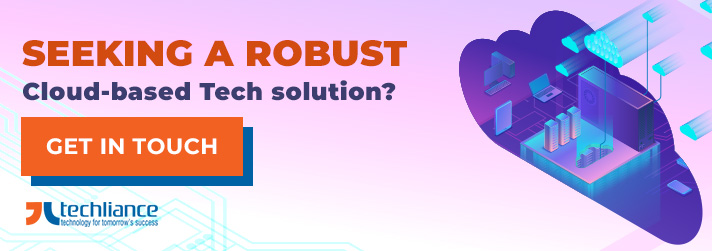
Conclusion
This appears that AWS as a front-runner in the cloud market will continue its supremacy in 2024. The culture for cloud-based solutions continues internationally. Because it allows companies to have an edge in expanding their business as they grow in revenue and user-base.
Google Cloud Platform is also ramping up on its cloud services. It is facilitating customers integrations with open-source projects and third-party services. Hence, this way its spread continues, allowing GCP to steadily try to win a larger market share.
This seems Google Cloud Platform has a lot of catching up to do with AWS. But its consistency will allow them to keep going and build a reliable market stake. We can safely conclude that both cloud platforms will continue serving businesses across the world.
AWS and Google Cloud Platform will remain in the cloud market for a long time battling out tirelessly. They have to keep close eyes on Microsoft Azure, the third contender in the top 3 cloud platforms. Also, they can’t ignore recent players like Alibaba Cloud, IBM Cloud, Salesforce Cloud, and Oracle Cloud.
Are you on the hunt for a cloud-built solution? And you’re not sure what to do and where to start. Let the experts at Techliance help you today. The future is here, and it can turn more exciting than ever with IT specialists like us.




